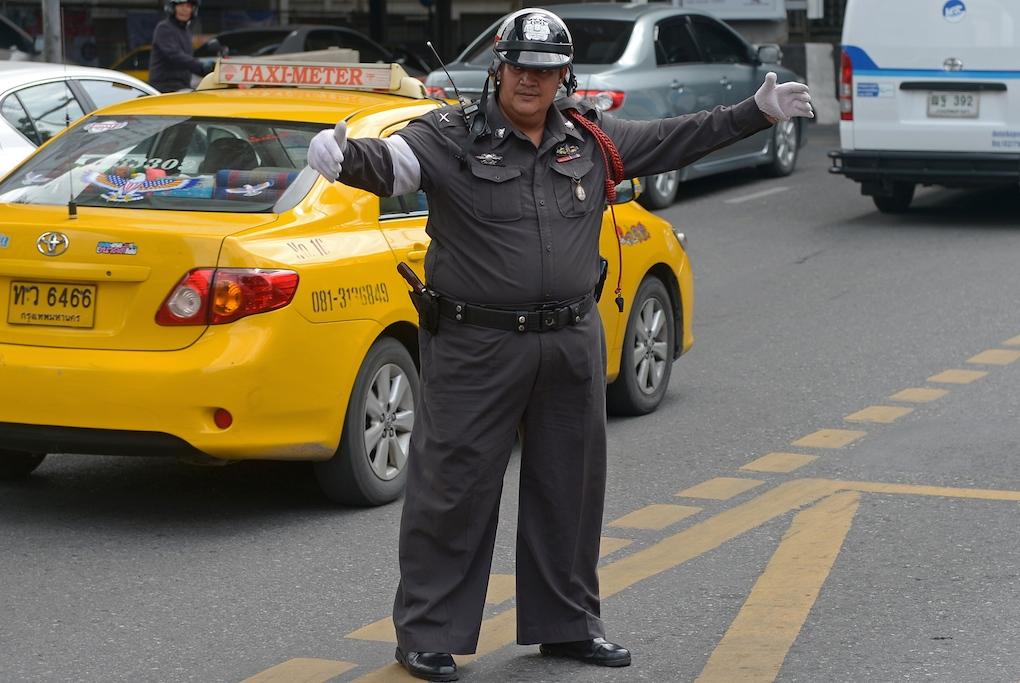Thailand’s junta bribes traffic cops to stop taking bribes
To protect and swerve.
BANGKOK — As in most of Southeast Asia’s capital cities, driving in Bangkok is often maddening. There are street dogs to dodge. Highways strangled by gridlock. When the monsoons come, busy avenues can quickly turn into mucky canals.
Add to that a common indignity: cops squeezing drivers for petty bribes.
But under a moralizing military junta, which seized power in a May coup, the rules are being rewritten.
Thailand’s traffic police are now more strongly compelled to say no to bribes. It’s not because they’ve suddenly realized corruption corrodes law and order, which they’re meant to exemplify.
The change of heart is instead owed to a new policy: Cops who turn down bribes can be rewarded with $300.
Most Thais already have a dim view of the police.
A June poll suggests that more than 90 percent want the police force to be reformed. The police chief, installed by the military, proclaimed that the $300 reward scheme “could help root out the entrenched culture plaguing our society.”
But one of Thailand’s most esteemed economists doubts the plan will have much of an effect. Ammar Siamwalla, of the nonprofit Thailand Development Research Institute, said the “whole corruption problem in the police department is too ingrained. No easy formula will work.”
“You could say the police department is really a corporation. It’s a business empire,” Ammar said. “Their fingers are in so many pies.”
Thailand's police corruption is nothing if not diversified. The Thai press is routinely filled with scandals linking cops to illicit ventures in smuggling, nightclubs, gambling dens and much more. Some of these enterprises pay police for protection. Others are controlled outright by officers. Pasuk Phongpaichit, a Thai economist who has studied black markets, has written that Thai policemen "effectively license illegal activities in return for a regular fee or informal tax."
But the average Thai civilian is much more likely to run afoul of cops on street patrol, namely in traffic or during stop-and-frisk searches. Cops seldom chase down motorists with flashing red lights as in the United States. They simply saunter into traffic and wave down drivers for alleged petty offenses.
This situation can go one of two ways. The driver can be hauled into the station for an afternoon of tedious paperwork and fines. Or a few loose bills can be discreetly pressed into the cop’s palm through the window.
Thailand’s corruption problem does little to differentiate it from much of the planet. According to Transparency International, one in four people worldwide paid a bribe in 2012. The most commonly bribed institution? Police.
For Thais, it could be worse. Transparency International ranks Thailand’s corruption (rated by perception) as somewhat average on a global scale: the country ranks 102 out of 177 nations surveyed. That’s a little worse than India and a bit better than Mexico.
There is no doubt that Thais crave police reform. But there are plenty of doubts that this approach — rewarding cops to obey the law — is what they had in mind.
Introduced in early October, the policy has sparked an online panic so noisy that top police generals briefly promised to re-evaluate the plan. The police chief, Somyot Pumpanmoung, has since publicly backed the idea — and also offered to reward citizens $300 if they can present evidence proving police are dirty.
Ending traffic bribes amounts to a radical shake-up of the rules.
For decades, cops have compelled motorists to bribe them. Now the cops are incentivized to double-cross drivers. Police can’t collect their $300 without making arrests for attempted bribery, and at least two men have already been nabbed. One offered a $3 bribe and the other offered $1.50; both were stopped for making illegal turns.
“Game changer! … Police fines gone legit!” screamed one Thai-language gossip site. Another message, gone viral on social media last week, warned Thais to “Stop bribing cops! They’ve all got spy cameras stuck to their bodies … it’s junta policy!”
Sure enough, photos emerged online of an officer allegedly covered in secret cameras — one each in his glasses, his pen and his top shirt button. (The annotations on the images below read: "glasses cam, button cam, pen cam.")
![]()
Thai police are structurally incentivized to collect cash under the table. Officially, they start off making minimum wage. Many are even forced to buy their own sidearms and uniforms, which can be paid down through a layaway-style plan.
Rookie cops working the boondocks make as little as $185 per month. That’s roughly $50 less than a newly hired 7-Eleven cashier makes in Bangkok, where the minimum wage is higher. The real money comes from petty bribes, protection rackets and other underground sources of income.
Dismal salaries and bribery go hand in hand. But it will be difficult to get Thais to cheer on pay hikes for the police, Ammar said.
“As a taxpayer, I don’t want to increase the police salary. Not until they’ve already cracked down hard on corruption,” he said. “They’re making a lot of money as it is. They’re not downtrodden.”
Every day, reporters and producers at The World are hard at work bringing you human-centered news from across the globe. But we can’t do it without you. We need your support to ensure we can continue this work for another year.
Make a gift today, and you’ll help us unlock a matching gift of $67,000!
